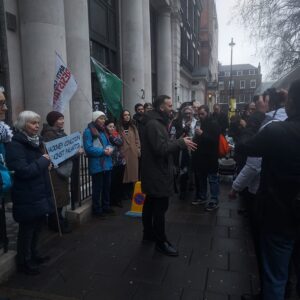Source >> Gilbert Achcar blog
The short statement addressed to “leaders of North American Jewry” and signed by many “academics and other public figures from Israel/Palestine and abroad” is certainly a welcome initiative. Asserting that “there cannot be democracy for Jews in Israel as long as Palestinians live under a regime of apartheid”, the statement observes that “American Jews have long been at the forefront of social justice causes, from racial equality to abortion rights, but have paid insufficient attention to the elephant in the room: Israel’s long-standing occupation that, we repeat, has yielded a regime of apartheid.”
The statement therefore calls upon its addressees to:
- Support the Israeli protest movement, yet call on it to embrace equality for Jews and Palestinians within the Green Line and in the OPT.
- Support human rights organizations which defend Palestinians and provide real-time information on the lived reality of occupation and apartheid.
- Commit to overhaul educational norms and curricula for Jewish children and youth in order to provide a more honest appraisal of Israel’s past and present.
- Demand from elected leaders in the United States that they help end the occupation, restrict American military aid from being used in the Occupied Palestinian Territories, and end Israeli impunity in the UN and other international organizations.
There are, however, a few problems with the statement in my view. The following critical observations are not meant to be polemical but are intended as a contribution to a necessary dialogue.
1. It is not “Israel’s long-standing occupation” (meaning the occupation that started in 1967) that “has yielded a regime of apartheid”. The “regime of apartheid” is congenital to the State of Israel as it emerged from the 1948 war. It affected the minority of Palestinians who remained within the boundaries of the new state and was most famously described before 1967 by Palestinian lawyer and activist Sabri Jiryis in his book The Arabs in Israel, first published in Hebrew in 1965 and translated into several languages (the 1969 French translation was preceded by a brilliant essay by Eli Lobel, “Les Juifs et la Palestine”).
2. Calling for “equality for Jews and Palestinians within the Green Line and in the OPT” conflates two very different issues. The demand of equality between Jewish and Palestinian citizens of Israel is a perfectly legitimate and necessary democratic demand. The demand for “equality for Jews and Palestinians” in the West Bank implicitly postulates that Jews there, i.e. colonial settlers, have rights and that these rights should be equal to those of the Palestinian original inhabitants. Surely, Jewish settlers have much more license and power than the Palestinian natives in the 1967-occupied Palestinian territories, but they have no “rights” there whatsoever. Postulating otherwise is contradictory with the demand to “end the occupation”.
3. If “elected leaders in the United States” really wish to “help end the occupation”, they must not limit themselves to demanding that American military aid be “restrict[ed] from being used in the Occupied Palestinian Territories”. Israel has certainly enough military means of its own to pursue its occupation. What is needed to stop Israel from running towards the abyss is the threat of a cessation of all and every form of U.S. military aid: Only such a pressure can bring the Israeli polity and society to understand that they cannot carry on occupying Palestinian and other Arab territories and discriminating against Israel’s Palestinian citizens with the support of the world power that has been the main enabler of this behaviour since the 1960s.
Art (54) Book Review (127) Books (114) Capitalism (68) China (81) Climate Emergency (99) Conservative Government (90) Conservative Party (45) COVID-19 (46) EcoSocialism (60) Elections (83) Europe (46) Fascism (62) Film (48) Film Review (68) France (72) Gaza (62) Imperialism (101) Israel (129) Italy (46) Keir Starmer (56) Labour Party (113) Long Read (42) Marxism (49) Marxist Theory (47) Palestine (182) pandemic (78) Protest (153) Russia (343) Solidarity (150) Statement (50) Trade Unionism (144) Ukraine (351) United States of America (139) War (370)
The Anti*Capitalist Resistance Editorial Board may not always agree with all of the content we repost but feel it is important to give left voices a platform and develop a space for comradely debate and disagreement.
Latest Posts
- We stand with RojavaYou probably haven’t heard about the stabbing of a young man at a demonstration in Salford on Wednesday 21 January. But then you probably haven’t heard about the demo. held at Media City on Salford Quays so it wouldn’t have been too difficult for a reporter to have covered it. But the silence from the BBC, notes Geoff Ryan, was hardly surprising. The demonstration was called to protest the silence of the BBC on the slaughter being carried out of the Kurds of Rojava in Syria by the Syrian army, by Turkish backed militias and supporters of Islamic State (ISIS).
- Stop Palentir looting NHSDave Kellaway reports from the Thursday 22nd protest at Palentir HQ against Labour giving them a massive NHS contract.
- Big tech as traffickersFrancisco Louçã analyses Big tech. Is it a new power of techno-feudal lords as Varoufakis argues or an oligarchy of data traffickers?
- Iran: Campism and the Erasure of TheocracyNew forms of campism are undermining internationalism. Simon Pearson discusses.
- Labour in office – the way forward for the left in BritainReflecting on Labour and the British left, Alan Thornett discusses the situation.






